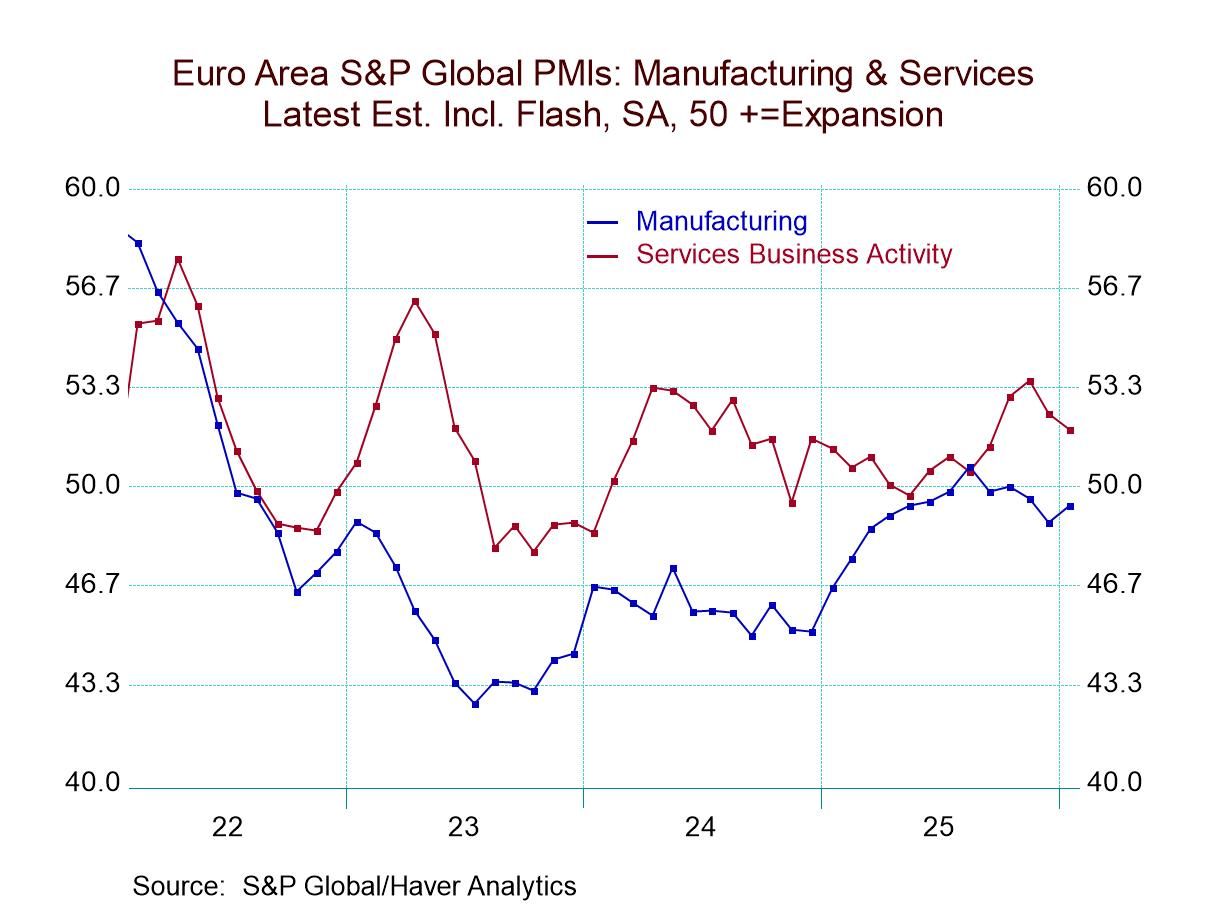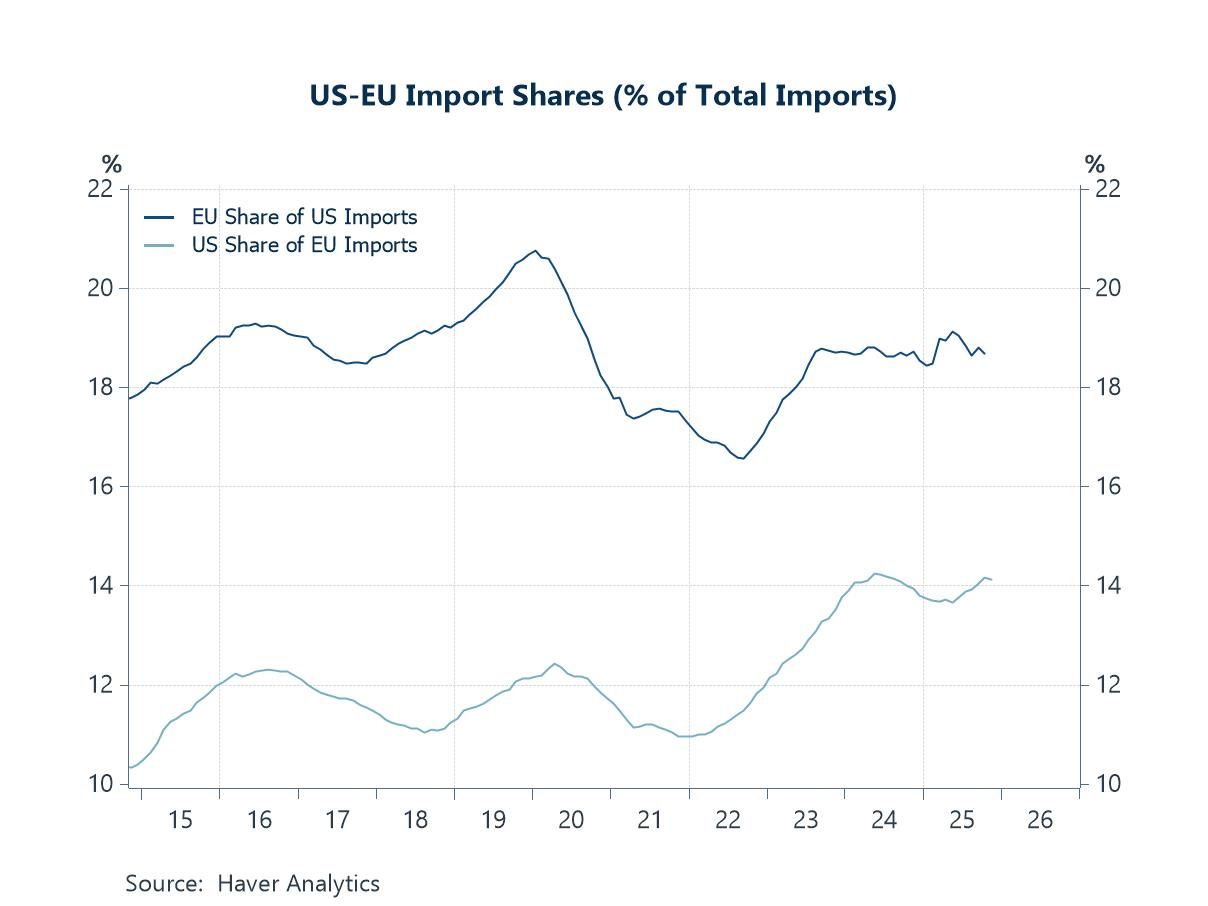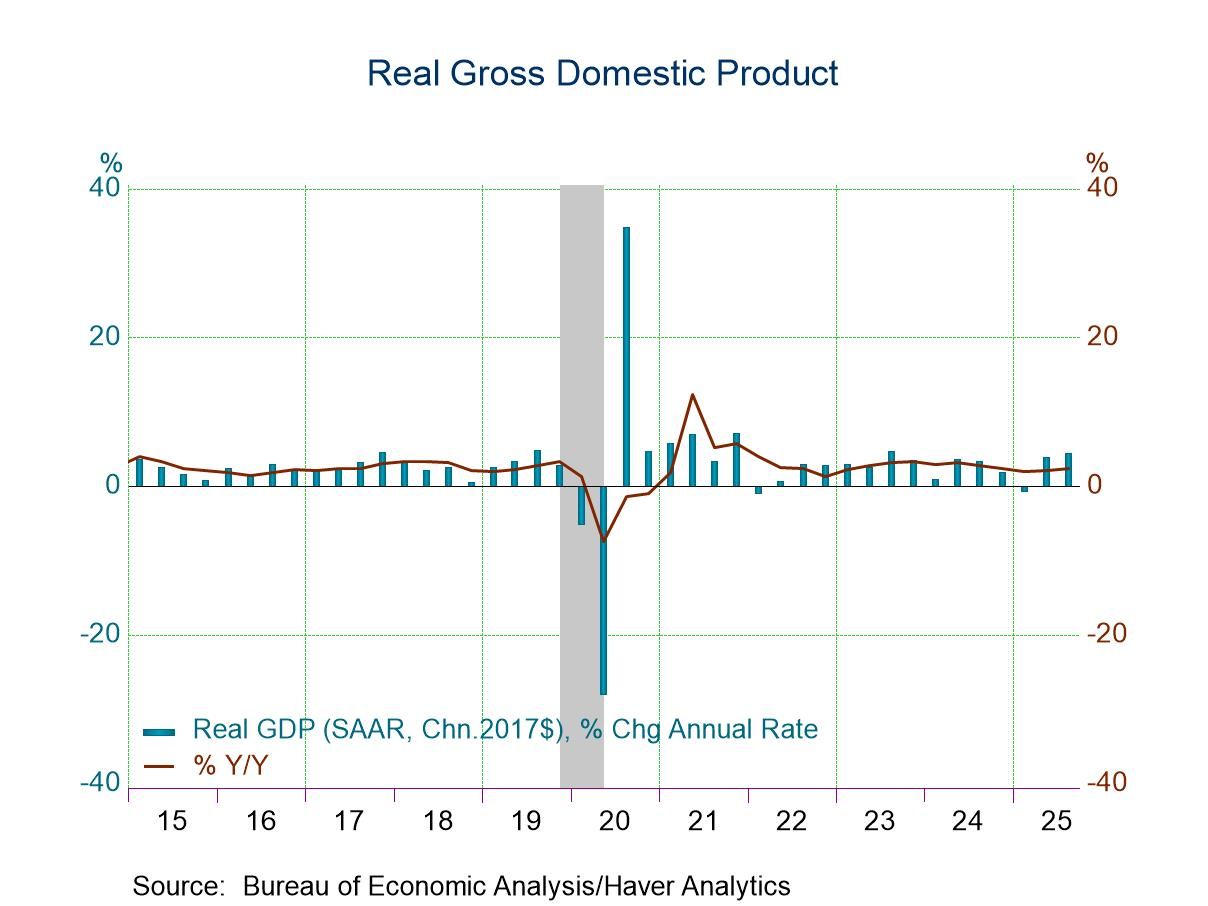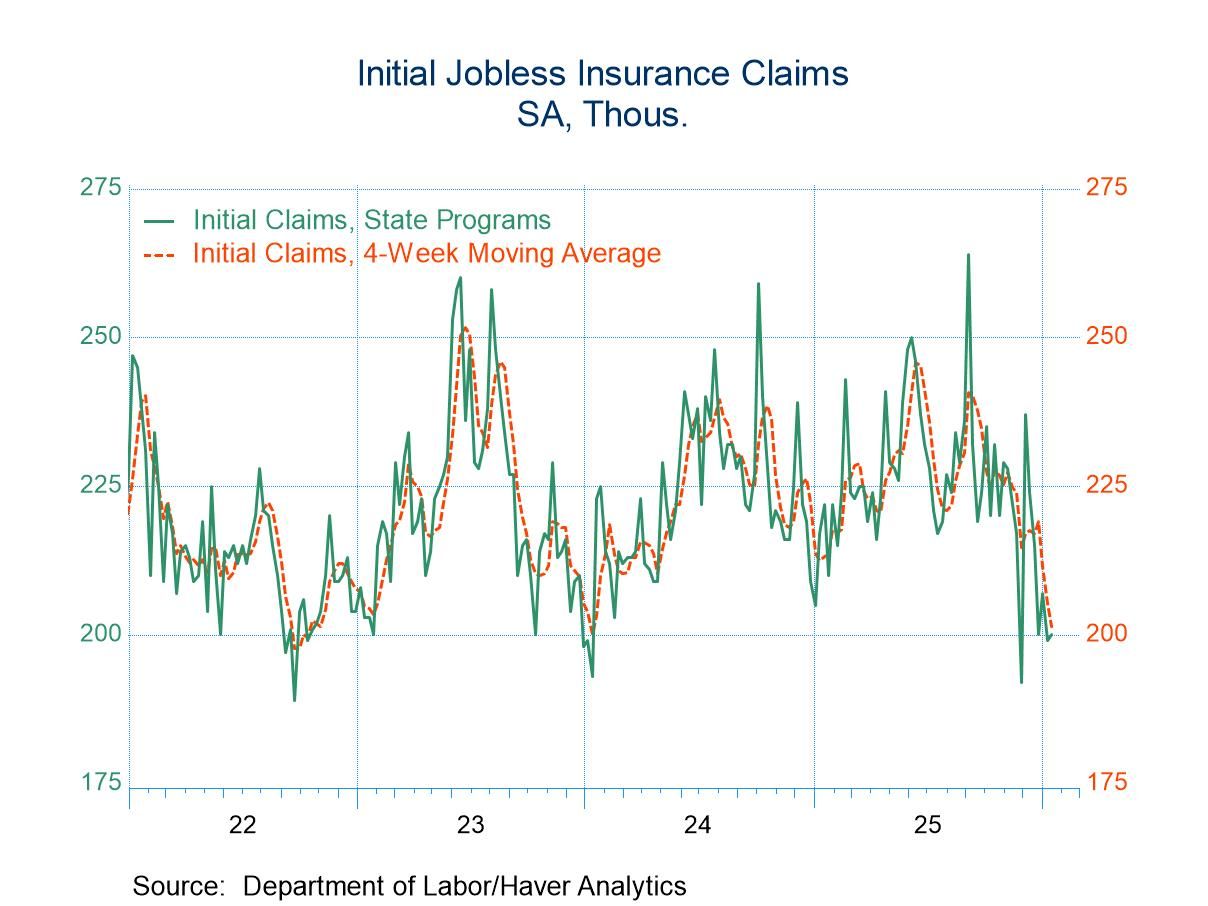 Global| Apr 13 2011
Global| Apr 13 2011Euro-Area IP Advanced More Strongly in Feb
Summary
Europe's consumer sector is losing momentum as capital goods are gaining speed. Meanwhile intermediate goods seem to catching on and accelerating after a brief lull in momentum. Consumer goods sequential growth rates have pitched a [...]
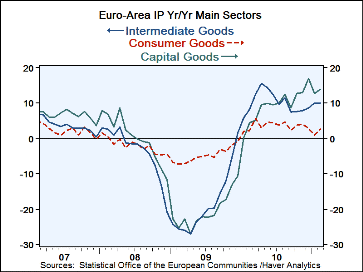 Europe's consumer sector is losing momentum as capital goods are gaining speed. Meanwhile intermediate goods seem to catching on and
accelerating after a brief lull in momentum.
Europe's consumer sector is losing momentum as capital goods are gaining speed. Meanwhile intermediate goods seem to catching on and
accelerating after a brief lull in momentum.
Consumer goods sequential growth rates have pitched a low profile over 3-mo 6-mo and 12-mo. For intermediate goods growth rates have been largely preserved at a strong pace in the 7%-10% range. While Yr/Yr capital goods trends are accelerated, sequential growth rates show a slight but steady erosion in the rate of capital goods output from 14% over 12-months to an annual rate of 7.6% over three months.
Output trends across the Zone's largest economies still look relatively solid except in Italy. While Italy's three-month growth rate is positive (barely) its six month rate is negative. Spain has a one-month negative growth rate for industrial output but is still posting a rate of nearly 6% over three months. The UK, not an EMU member, has and IP growth rate that went flat in February and has decelerated from a 5% pace over 12-months to a 3.1% annual rate over three months. Other UK measures like retail sales are turning soft.
Growth in France and in Spain is steady or accelerating. Moreover, the ECB has already started to hike rates even with uneven economic conditions in place. Today France posted a CPI with the headline up by 2.2%. But excluding energy French prices are up less than 1% Yr/Yr. The ECB can hardly be said to be justified in its tightening by this French report. Instead, it is being dogmatic and is being swayed by economic conditions in Germany where the economy has been hotter. When energy prices rise no central bank can keep that from hitting headline inflation. It can help to prevent that rise from being passed into the core by a variety of measures that do not require hiking rates immediately.
The ECB is engaged in a policy of overkill even as it presides over a weakening Zone-wide economy. The industrial sector represented in today's reports by Industrial production is the strongest sector in the community and it is already showing unevenness. German growth leads the zone and Germany has the most inflation pressure. But the Zone itself does not share so many of Germany's problems that Zone-wide monetary policy should be sent to attack them. Moreover, the recent Zew survey suggests Germany itself may have an economy whose ongoing strength and momentum may have been overrated.
| Euro-Area MFG IP | ||||||||||
|---|---|---|---|---|---|---|---|---|---|---|
| SAAR Except M/M | Mo/Mo | Feb 11 |
Jan 11 |
Feb 11 |
Jan 11 |
Feb 11 |
Jan 11 |
|||
| Euro-Area Detail | Feb 11 |
Jan 11 |
Dec 10 |
3Mo | 3Mo | 6Mo | 6Mo | 12Mo | 12Mo | Q:2 Date |
| MFG | 1.1% | 0.7% | 1.0% | 11.7% | 13.4% | 9.0% | 9.8% | 9.0% | 8.2% | 12.1% |
| Consumer | 1.0% | -0.3% | -0.2% | 1.9% | 0.8% | 1.7% | -0.2% | 2.7% | 1.0% | 1.4% |
| C-Durables | 0.4% | 1.8% | -0.7% | 6.1% | 8.2% | 0.3% | 2.7% | 4.3% | 2.5% | -- |
| C-Non-durables | 0.9% | -0.4% | -0.3% | 0.8% | -0.2% | 1.6% | -0.6% | 2.3% | 0.9% | -- |
| Intermediate | 0.5% | 2.7% | -1.0% | 8.7% | 15.4% | 6.8% | 10.0% | 10.2% | 10.2% | 14.7% |
| Capital | 0.6% | -0.2% | 1.4% | 7.6% | 11.8% | 8.9% | 14.5% | 14.0% | 12.8% | 7.8% |
| Main Euro-Area Countries and UK IP in MFG | ||||||||||
| Mo/Mo | Feb 11 |
Jan 11 |
Feb 11 |
Jan 11 |
Feb 11 |
Jan 11 |
||||
| MFG Only | Feb 11 |
Jan 11 |
Dec 10 |
3Mo | 3Mo | 6Mo | 6Mo | 12Mo | 12Mo | Q:2 Date |
| Germany: | 1.4% | 0.3% | 1.1% | 11.5% | 3.3% | 9.0% | 9.7% | 15.3% | 13.5% | 7.5% |
| France: IPxConstruct'n |
0.4% | 0.7% | 0.3% | 6.1% | 14.7% | 6.6% | 5.7% | 5.6% | 5.4% | 9.8% |
| Italy | 1.2% | -1.3% | 0.2% | 0.4% | -0.5% | -3.1% | -1.6% | 3.1% | 1.4% | -1.2% |
| Spain | -1.3% | 3.7% | -1.0% | 5.9% | 16.4% | -1.2% | 8.1% | 3.7% | 6.0% | 14.1% |
| UK:EU member | 0.0% | 0.9% | -0.1% | 3.1% | 5.8% | 4.2% | 5.2% | 5.0% | 6.6% | 5.0% |
Robert Brusca
AuthorMore in Author Profile »Robert A. Brusca is Chief Economist of Fact and Opinion Economics, a consulting firm he founded in Manhattan. He has been an economist on Wall Street for over 25 years. He has visited central banking and large institutional clients in over 30 countries in his career as an economist. Mr. Brusca was a Divisional Research Chief at the Federal Reserve Bank of NY (Chief of the International Financial markets Division), a Fed Watcher at Irving Trust and Chief Economist at Nikko Securities International. He is widely quoted and appears in various media. Mr. Brusca holds an MA and Ph.D. in economics from Michigan State University and a BA in Economics from the University of Michigan. His research pursues his strong interests in non aligned policy economics as well as international economics. FAO Economics’ research targets investors to assist them in making better investment decisions in stocks, bonds and in a variety of international assets. The company does not manage money and has no conflicts in giving economic advice.



